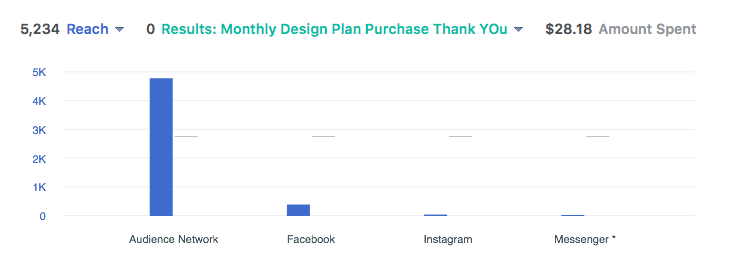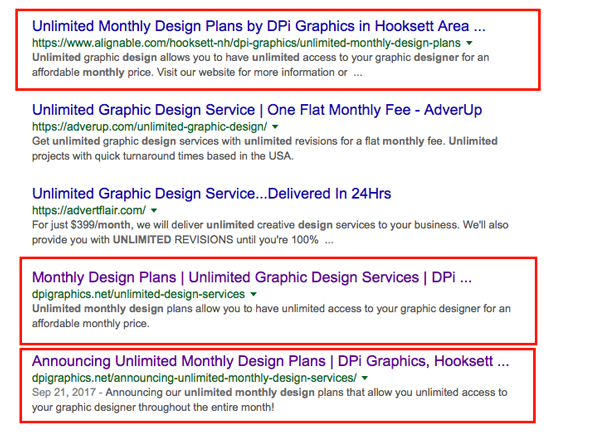Why I Have A Hard Time Justifying Digital B2B Advertising
Yeah, I said it. Digital B2B advertising, specifically Google Adwords, Twitter for Business ads, Facebook ads – they all provide some type of ROI… I’m just not sure what yet. You see, digital advertising has gone the way that traditional SEO has – pay to play – but you’ll need a HUGE budget to actually make it worth while. I don’t use ongoing search engine advertisements like some larger companies do. Hell, I don’t often run online ads to promote a new product or service for the shear reason that the ROI…well… sucks.
You can say, “Jeff, it’s because your X was wrong. Do Y and you’ll do Z.” That’s a possibility. Maybe I didn’t give it long enough. Maybe my verbiage wasn’t right. Maybe my offer wasn’t worthy enough to click. I think the real reason – a closer to the truth reason – is that people just don’t click on ads. And those that do – are they truly your ideal customer?
Moreover, how do you think you’re going to compete with the likes of Amazon, Walmart, Best Buy and more? They’ve got deep pockets. They’ve got a wide variety of products. And, they’ve got search engines like Google on their side. Wait, what? Yup. Google has a lot of data. A LOT. And, they are using it. They are using things like reviews, sites like Zagat and Yelp where people rate businesses based on their experiences, and of course, local search. Does this mean that every local business will show up in a given search? Nope. It means that local search has a better chance of listing businesses when you search for “widget maker near me.” Note the near me part.
You’re probably saying, “Dude, you’re crazy. Adwords is the bomb. You’re just not using it right.” Maybe. Maybe not. Maybe it’s the industry I’m targeting. Maybe it’s all about timing. Maybe not. Given the sea of information available on Google (and other search engines) and the number of advertisers (which is increasing year over year), I’m thinking, to reach other businesses, you must really have quite an Adwords budget, otherwise, you’re not getting your money’s worth either.
The point I’m trying to make here is that SEO has changed. Traditional SEO as we have come to know it with keywords, meta descriptions, titles, good HTML markup – all that stuff – has changed. We are now in the “pay to play” era of SEO, however, it seems that only those with the budgets to keep up will be contenders for that top ranking spot. Get where I’m going with this?
Don’t get me wrong – correct HTML markup and a responsive UI is still going to help you rank higher than other websites that aren’t built right or aren’t optimized for mobile users. There are more metrics and more complex alogrithms that are now calculating page rank. Don’t even get me started on Google’s SSL update.
However, there’s an alternative to “pay to play” SEO and that’s where my money is.
You’ve probably heard by now that “content is king”. Well, it really is and that’s no joke. While “pay to play” may be the name of the game when you’re trying to rank for a certain keyword phrase, it doesn’t build customer loyalty. It doesn’t show that you’re an authority on the subject and it doesn’t get consumed the same way by people searching for stuff online. Point being – use valuable content – the stuff your audience REALLY wants to see to help you rank for your keywords.
Think content is a new thing and SEO changed last night? Ryan Steward from MOZ, I think the most trusted source for all things SEO on the web, back in October of 2015 that two things were happening then to change SEO. First, Google’s data – they’ve got a lot of it and they are using it to provide a better search experience and to deliver more relevant search results. Secondly, as I mentioned before, we’ve begun the “pay to play” era with Google – he even states that back then, “Google’s main source of revenue is advertising, counting for almost 90% of Google’s revenue in 2014. And one of their main earners, display, is falling fast.” The title of his article was even called “Why I Stopped Selling SEO Services and You Should, Too”. That’s tells you a lot.
Anyhow, I have a hard time justifying the use of digital advertising. I get lots of clicks. Lots of them. I get lots of exposure and impressions. However, conversions are another story. Recently, I did a campaign where I optimized my landing page for conversions that did well with exposure and got several clicks, but failed to convert. I coordinated a Facebook ad during the same timeframe and had the two ad campaigns running simultaneously, but yielding the same results – lots of exposure, a couple clicks and no conversions. This is when I started to dig deeper into ads and conversions.
My Google Adwords Ad (which mimicked social media marketing and ads)
According to MOZ, Facebook advertising is really only suitable in B2C markets, which is likely the first problem. Where Facebook has increasingly shifting toward more individual relational content and less about the brands you follow, this is likely to be true. Depending on your target market, the majority of your audience can be irrelevant when it comes to your ad or offer, which is the second problem. CPCs (Costs per click) are relatively low but can be expensive if the campaign isn’t setup correctly. My costs per click (not costs per conversion) were $2.13 each.
Some of my analytics from my most recent campaign on Facebook



Let’s take a look at Google Adwords. Adwords can be pricey if the campaign isn’t setup right and like Facebook, the ad can be irrelevant to your audience. Depending on your industry, CPCs can be high with Google Adwords – my costs per click on my most recent campaign were $7.01 with only 6 clicks and 659 views. The ad ran for approximately 3 weeks and most of the pageviews for my landing page bounced which leads me to believe that people clicked the ad by accident. It’s worth noting here that not a single conversion was made on either campaign.
Am I completely against digital advertising? No. It has its place, I’m just not sure if the ROI is worth the budget that needs to be allocated to generate leads from the campaign. Digital advertising, especially Adwords, can give you an immediate boost in exposure and that alone is worth something, however, if your goal is conversions, you’ll be disappointed. Depending on your industry, and depending on how deep your pockets are in your digital advertising budget, you may or may not do well promoting your products or services and keeping up with corporations that have larger advertising budgets.
There is a better way, though.
Let’s think about using content as a means for ranking and exposure. So, using the power of content and posting and sharing that content on social networks (Facebook, Twitter, Google+, LinkedIn, etc.) and submitting your sitemap to Google Webmasters which includes your keyword optimized landing page, you can see what the results can be – long lasting content that won’t cost you per click and will help you rank organically, rather than by paid digital advertising.
I wrote keyword rich content for my landing page and really optimized it for conversion. I created a blog post (also keyword rich and linked it in a few different places, described the new service I am offering, added images with alt tags including the keyword) and then published it on my social media networks. I created a 5-6 week social media teaser campaign teasing the new service by asking questions that my new service would solve. Valuable content generates as good exposure (and more reliably placed) in the SERPs and on social media.
The result of a blog post shared to multiple social networks and a keyword optimized landing page.


The resulting listing above was the 6th listing while the listings below were all from page 2 of the same search.
The point is that while Adwords and social media ads can give you a temporary boost – meaning by “temporary” that your ad will most likely not run forever, especially if it’s a limited time offer. So, your ads may not live forever but your content – that’s the stuff Google and other search engines (because it’s search engine optimization not Google optimization) – good, consumable content. That’s where my money is – the production of quality, valuable content that will always be available.
So, ads really haven’t netted me anything other than a temporary boost to my site’s SEO and a CPC. And yes, you could probably say I should have stuck with it longer. Maybe I would have found that one conversion that would have changed everything. Maybe I’m missing the boat. Maybe “pay to play” is where it’s at. It’s all possible. However, from my past experience (this isn’t my only rodeo with social media digital advertising or SEM) I am finding it difficult to justify the ad spend on ads that just aren’t converting.
I’d welcome your questions (and criticism, as long as it’s constructive). What are your thoughts on SEM and digital advertising? Do you use them? Do they help you or is it just another monthly expense?







